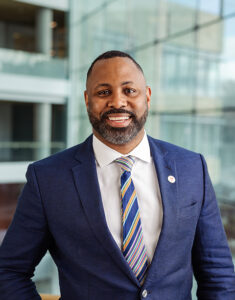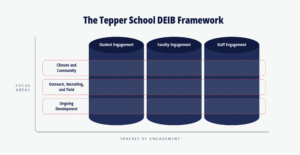Breaking Gender Stereotypes in Professional Networks
Consider the unique challenges women face in high-status professional networks and the systemic changes needed for true equity.

In the realm of business education, diversity, equity, inclusion, and belonging (DEIB) have moved from peripheral considerations to central elements of strategy and implementation. The Tepper School of Business is taking bold steps to redefine our approach to inclusivity and excellence, one of the first being to create a lean DEIB leadership team, which I lead as inaugural associate dean for DEIB, to propel the Tepper School forward towards a leadership position as a business school that truly fosters Inclusive Excellence.
Inclusive Excellence is a strategic approach to DEIB that integrates these principles into organizational culture, practices, and metrics. Unlike traditional DEIB initiatives, which might operate as separate or peripheral efforts, Inclusive Excellence seeks to embed inclusivity into the very fabric of an institution, ensuring it informs all decisions, actions, and goals across all operating units and academic programs. This concept aligns with the Carnegie Mellon University Framework for Inclusive Excellence. It moves beyond mere representation or compliance to foster a culture where every member’s contributions are valued, nurtured, and leveraged for the collective success and innovation of the organization.
Inclusive Excellence is essential to the Intelligent Future of Business because it creates environments where diverse individuals and perspectives are harnessed to foster innovation, learning, and community. Intelligence is inherently about using all the information available to learn, adapt, and solve complex problems in a dynamic environment, so it’s hard to imagine how an organization can achieve optimal intelligence without embracing all its available inputs. Thus, Inclusive Excellence not only enhances fairness and equity but also thrusts organizations toward the highest levels of achievement and impact.
The Tepper School’s DEIB Framework outlines a comprehensive strategy for Inclusive Excellence engaging all spheres of our community—students, faculty, and staff—while focusing on critical areas such as climate and community; outreach, recruiting, and yield; and ongoing development. The approach is rooted in a simple but powerful belief: real impact comes from systemic change, not just temporary programs or events (that might be easily taken away). This framework highlights the focal points guiding the transformative steps the Tepper School is undertaking to foster a more inclusive and intelligent future.
The framework organizes and guides our full enactment of the school’s DEIB strategic plan “Tepper Together.” It encompasses three main spheres of engagement — students, faculty, and staff — with tailored initiatives designed to engage and elevate each group. For students, the focus is on preparing them for success in an increasingly diverse workforce. Faculty development is geared towards enhancing their success to increase the Tepper School’s ability to foster student success. At the same time, staff initiatives aim to nurture our staff members’ growth and learning to enhance their effectiveness and ability to contribute to the school’s mission.
The framework emphasizes several focus areas across these spheres: fostering a climate that ensures all members across backgrounds and life experiences feel they belong within our community and are encouraged to thrive; broadening outreach, recruitment, and yield to draw from a wider, more diverse talent pool; and committing to ongoing development to continuously improve our practices and outcomes.

Achieving the goals of Inclusive Excellence requires a shift from a traditional program-focused approach to one that is more complex — where innovative programming continues but systemic changes in policies and procedures are the priority. This perspective is born from the understanding that lasting impact requires altering the core structures that shape our daily operations, interactions, and decision making. By aligning DEIB efforts with every operational unit’s goals and strategies across the Tepper School, we can be intentional about embedding inclusion into the very fabric of our community, ensuring it’s not an add-on but a fundamental component of all we do.
There are three main challenges in advancing DEIB efforts. One is the inertia of existing processes, particularly regarding outreach & recruiting. As business schools, we need to broaden our outreach and recruiting efforts far beyond the usual channels that are familiar to include untapped or underrepresented groups, such as by partnering with organizations like the Sadie Collective, AnitaB.org of the Grace Hopper Celebration, or Afrotech for prospective students and organizations like the Ph.D. Project, La Familia Management Scholars, or the Tenure Project for promising faculty candidates. We are making strides and being creative in how we partner, since doing so helps us achieve the Inclusive Excellence we seek.
A second challenge is the tendency to view DEIB efforts as moral gestures or charity rather than a crucial opportunity to enhance our community’s resilience and innovation. As Gunjan Kedia (MSIA 1994) commented in her keynote at the Tepper Women in Business (TWIB) conference in March, biological organisms that have more diversity among their cells are better able to detect and respond to a broader range of infections and thus can thrive in more environments; if the cells are all the same, an infection can quickly take hold and wipe them all out. Similarly in organizations, diversity leads to more robust, more adaptable organizations capable of handling greater complexity, with enhanced ability to make more innovative connections to achieve more significant impact. Seeing DEIB as merely the right thing to do overlooks its vital importance for an increasingly complex, multicultural environment. We foster diversity in backgrounds, identities, and life experiences here at the Tepper School because it makes us as an organization and our community of scholars and learners more robust.
The challenges of inertia and a tendency to view DEIB efforts through an altruistic lens may both be contributing to a third challenge: that of over-correcting in response to interventions (backlash). For example, the recent ruling by the U.S. Supreme Court to end Affirmative Action in admissions decisions has been grossly misinterpreted by some as a broad mandate to end any and all inclusion efforts. That degree of overcorrection could mean unnecessarily missing the opportunity to prepare our students to meet an increasingly dynamic and diverse environment more fully equipped. Student development is a key focus area of the Tepper School’s DEIB Framework where more and more learning opportunities are being made available to our students, including initiatives such as the jointly sponsored Gender Equity Summit, where successful women executives were brought together with students to share insights on mentoring, sponsorship, and team effectiveness.
In order for the Tepper School to accomplish its goals of Inclusive Excellence, we will need the entire Tepper School community to engage actively in DEIB efforts. Rather than waiting for directives, individuals are encouraged to integrate DEIB into the core of what you do. Take the lead within your portfolio to build more inclusive programs, events, and courses. The Tepper School’s DEIB leadership team is willing to collaborate with you as needed. No need to look for a general “authorized” checklist to outline the steps needed to make a program, event, or course more inclusive; instructors or organizers are empowered to take the lead in thinking about ways to build in more inclusivity using their expertise. Depending on your sphere of engagement (student, faculty, staff), consider the three focus areas of the DEIB framework to help guide your thinking:
We will succeed most in Inclusive Excellence if everyone in the Tepper School community embraces the challenge of accomplishing it with enthusiasm and creativity. The team in Tepper School’s DEIB can be partners, collaborators, co-creators, or co-sponsors. This dynamic partnering construct is a more efficient and effective way to engage all members of the Tepper School community and leverage the diverse perspectives and talents available to drive meaningful change.
As the Tepper School strides forward to implement our DEIB Strategic Plan, “Tepper Together,” the goal is clear: to not just participate in the dialogue on Inclusive Excellence, but to lead it. By embedding DEIB into our core strategies and operations, we’re not just preparing our students, faculty, and staff for the future; we’re shaping a future that is more inclusive, resilient, and excellent. Focusing on systemic change, broadening outreach, and fostering community engagement charts a course for the Tepper School that promises not only to elevate our own community but to set a standard for business schools and organizations everywhere.
The Tepper School of Business is at a pivotal moment, with a unique opportunity to redefine what Inclusive Excellence means in business education. If we embrace it, we can transform our community in ways that will have a lasting impact on our students, faculty, staff, and the broader society. Through a concerted effort, strategic focus, and a commitment to systemic change, we are poised to lead the Intelligent Future of Business by example, demonstrating the undeniable value and strength found in diversity, equity, inclusion, and belonging.